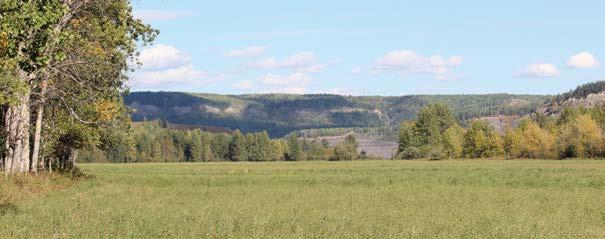
4 minute read
Green Building Policies Set to Catalyze Construction Innovation and Create $3.3 Billion in Business Opportunities
Fiona Famulak
With a rich history dating back to 1929, the Vancouver Regional Construction Association (VRCA) is the largest of four regional construction associations in British Columbia and fifth largest in Canada.
It serves the general and trade contractors, manufacturers, suppliers, and professional services providers that operate in the industrial, commercial, institutional, and high-rise residential construction industry in the Lower Mainland.
VRCA’s member companies are part of an industry that delivers $15 billion completed projects, e.g., schools, hospitals, and other essential infrastructure, on an annual basis; provides 9 per cent of BC’s wealth; and employs almost 250,000 men and women, making it the largest employer in BC’s goods and services sector.
The industry is very large and contributes in myriad ways to our communities and economy. It also has some challenges ahead.
At VRCA’s 2019 Construction Leadership Forum in Whistler, Monte Paulsen, Passive House Specialist with RDH Building Science Inc., made the statement, “By 2032, every BC builder will face a simple choice: Build like Passive House or build somewhere else.” His statement caught my attention.
We know that the construction industry in British Columbia and, in particular the Lower Mainland, has some key milestones ahead, whether it be navigating the skilled labour shortage through 2021 and beyond, when demand for construction services is at an unprecedented level, or building to support Metro Vancouver’s projected population growth of one million newcomers by 2041.
Monte’s statement wasn’t directed at the supply of labour or population forecast, however. He was referencing the process of construction and specifically the need for all new residential and commercial buildings in Vancouver to be built to zero-emissions standards by 2030 and for all new buildings in BC to be net-zero-energy-ready by 2032.
Such milestones require the construction industry to build faster, greener, and more productively than ever before. Building “greener” includes the need to adapt to new, high-performance building standards. What I hadn’t fully acknowledged until that moment in Whistler is the risk of not adapting to those standards . . . the risk that a company might find itself out of business if it doesn’t change.
While the pace and scale of BC’s construction market transformation is daunting, it has several positive qualities.
First, the provincial government’s Energy Step Code—a voluntary provincial standard enacted in April 2017 that provides an incremental and consistent approach to achieving more energy-efficient buildings that go beyond the requirements of the base BC Building Code—and the City of Vancouver’s Greenest City Action Plan—a strategy for staying on the leading edge of city sustainability— provide a clear road map of code changes and their timing.
There’s no guessing what’s required and when. What’s more, the policies will help to catalyze construction innovation in an industry that is ripe for change.
Second, the City of Vancouver, recognizing that the industry needs help to meet the former’s 2030 milestone (and 2025 stretch milestone), seed-funded our Zero Emissions Building Exchange (ZEBx), the first and only in Canada, for the purposes of expediting
understanding of and capacity to build to zero emissions standards. ZEBx has recently celebrated its first year of operation and has already cemented its place in the industry as the go-to resource for zero-emissions building advice.
Third, the market transformation that will disrupt BC’s construction industry unlike anything seen in generations brings with it significant business opportunities. A recent research study “Green Buildings Market Forecast, Demand for Building Products, Metro Vancouver, 2019–2032,” published by the Vancouver Economic Commission, reports that local and provincial zero-emissions and net-zero-energy-ready building policies are creating a $3.3 billion market for high-performance building products and technologies in Metro Vancouver alone.
Our Board of Directors anticipated significant and fast-paced industry change when it set the strategic direction for our association in 2017. It identified that excellence, underpinned by a culture of learning and innovation, is a critical factor for the survival and prosperity of VRCA’s members and BC’s construction industry as a whole. Our vision is clear. Our foundation is strong. And our commitment to serving members is unwavering.
In 12 years’ time, what we build today will be obsolete. Our industry therefore needs to change. In collaboration with its many industry partners, VRCA is actively working to help ensure the development, design, and construction communities are ready for what lies ahead. s Fiona Famulak is President of the Vancouver Regional Construction Association.
Uniquely West Coast™
George E.H. Cadman, Q.C.* 604 647 4123 | gehcqc@boughtonlaw.com
With over 30 years’ experience, George makes the complex simple to resolve your real estate or corporate disputes.
*Member of the Notaries Public Board of Examiners
Mercedes Wong, CRE CCIM FRI RI Mercedes Wong Personal Real Estate Corporation Vice President of International Development
829 Cambie Street Vancouver, BC V6B 2P4 www.mercedeswong.com
“I have moved to a new company.”
C: 604-808-2571 O: 778-317-5113 E: mercedes@telus.net F: 1-855-663-6653
Proudly helping the BC legal community complete 150,000+ real estate transactions every year
Powerful and flexible conveyancing, designed by and for BC legal professionals
www.doprocess.com/prosuite








